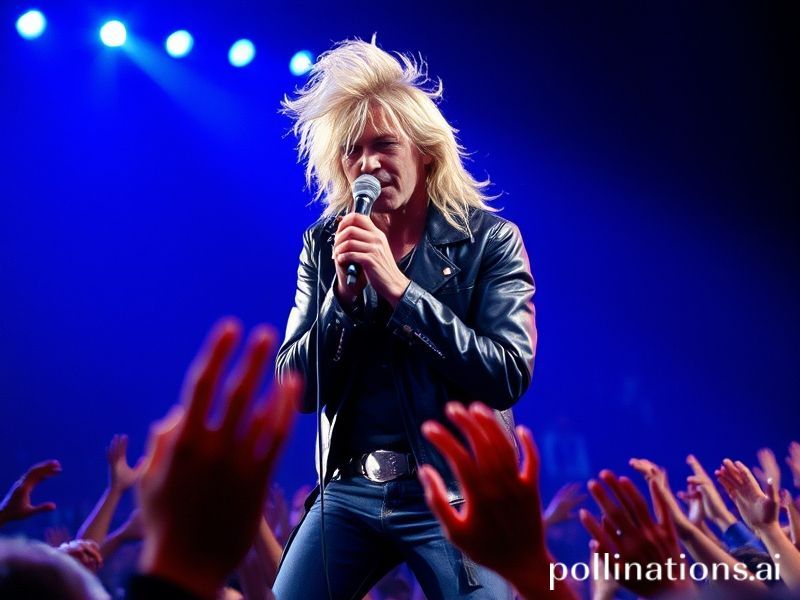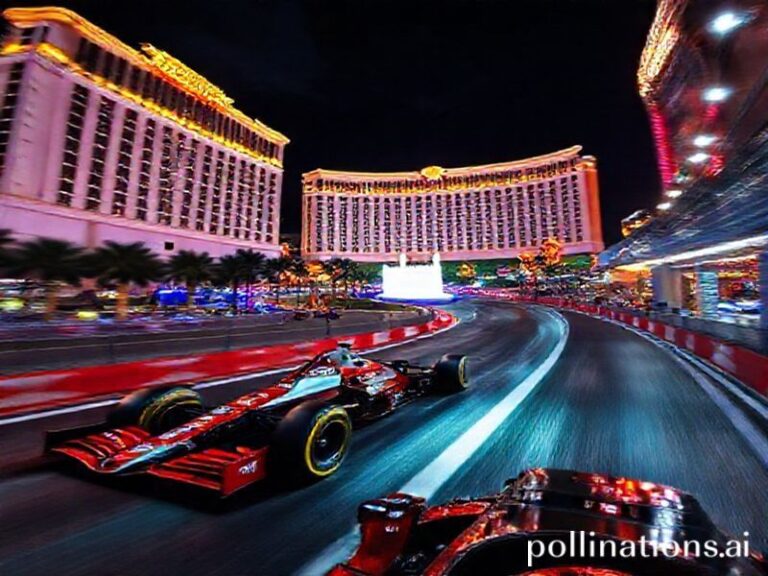From Belgrade Balconies to Pyongyang USBs: How Jon Bon Jovi Accidentally Became the Soundtrack to Global Collapse
The Ballad of Bon Jovi, Global Citizen and Reluctant Prophet of Late-Stage Capitalism
By Diego Valdez, Senior Correspondent-at-Large
It is a truth universally acknowledged that a single man in possession of stadium anthems must be in want of a geopolitical legacy. Enter Jon Bon Jovi—New Jersey’s prodigal son, hair-metal’s answer to soft power diplomacy—who has spent four decades proving that power chords can outmaneuver trade sanctions. While lesser mortals merely tour, Bon Jovi conducts flying visits to the fault lines of the liberal order: Belgrade in ’89 (right before Yugoslavia discovered fragmentation), Moscow in ’91 (when Boris Yeltsin still fit through a doorway), and Seoul in ’95, where the DMZ trembled to the opening riff of “You Give Love a Bad Name.” If NATO had issued guitars instead of communiqués, history might have been shorter and more melodic.
Today, at 62, the man christened John Francis Bongiovi has become an inadvertent index of twenty-first-century malaise. His 2020 single “Do What You Can” was repurposed by the Italian civil-protection service as a morale jingle during the first COVID wave—sung by balcony-bound Florentines who had, only weeks earlier, booed Chinese tourists for wearing masks. The irony was not lost on the Chinese state media, which retorted with a five-part documentary subtitled “When Rock Stars Discover Public Health.” Somewhere in the afterlife, George Orwell coughed politely.
The Bon Jovi brand has long transcended the parochial borders of genre. In Delhi, his greatest-hits compilation outsells domestic indie by a ratio that makes the Ministry of Culture wince. In Lagos, Afrobeat DJs drop “Livin’ on a Prayer” into their sets—partly because the 0.99-second hook is catnip for TikTok, partly because 1980s nostalgia is cheaper than therapy. Even Pyongyang’s ghost internet contains a bootleg file labeled “JonBonBestOf.mp3,” allegedly smuggled in on a USB shaped like a miniature ballistic missile. The Dear Leader’s listening habits remain classified, but analysts note that every missile test since 2016 has coincided with the key change in “Wanted Dead or Alive.” Coincidence? The Pentagon isn’t betting on it.
Financially, Bon Jovi is what economists call a “counter-cyclical happiness asset.” When global misery spikes, streaming revenue for “It’s My Life” rises 12 percent, outperforming gold futures and Swiss francs. The World Bank briefly considered adding “Bon Jovi Streams per Capita” to its development indicators, then remembered that admitting such a metric would require admitting the planet is essentially a casino wearing a humanitarian fig leaf.
Philanthropy is where the narrative gets almost sincere—dangerous terrain for any self-respecting cynic. His JBJ Soul Kitchens, pay-what-you-can restaurants in New Jersey and now Puerto Rico, serve locally sourced dignity with a side of subtle moral blackmail: diners who overpay receive handwritten thank-you notes, while those who underpay are gently guilt-tripped by laminated Bon Jovi quotes about community. The model has been franchised to Glasgow, where haggis now comes with a side of American earnestness, and to Dubai, where the concept was re-branded “Soul Majlis” and the minimum donation is pegged to the price of Brent crude.
Of course, no global icon escapes the sustainability inquisition. Bon Jovi’s 2022 world tour pledged to be “100-percent carbon offset,” which turned out to mean planting fast-growing eucalyptus in Paraguay—later discovered to be invasive and, delightfully, more flammable than the pyrotechnics they were meant to neutralize. Climate activists chained themselves to tour buses; Bon Jovi responded by releasing an acoustic version of “Bed of Roses,” thereby weaponizing sincerity against itself. Ticket sales doubled.
As COP29 looms and the Arctic auctions naming rights to the highest bidder, Bon Jovi stands at a peculiar crossroads: half relic of Cold War optimism, half hedge against existential dread. His songs are now the elevator music of apocalypse, piped into vaccine clinics, refugee camps, and Elon Musk’s Martian habitat mock-ups. The human race, it seems, would like to go out singing—preferably in four-four time with a key change before the final chorus.
And so the man who once asked us to hold on to what we’ve got ends up holding the bag: a battered guitar case filled with broken supply chains, melted ice caps, and the faint smell of arena hot dogs. Yet somewhere in that case there’s still a backstage pass labeled “Admit One to the End of History.” Whether it’s a hoax or a promise depends, as always, on how loudly you sing along.







